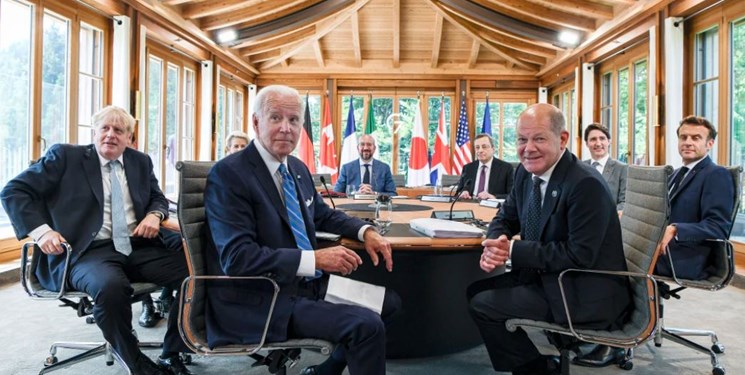There are a number of promises in G-7 program which were not in China’s One Belt – One Road initiative, i.e., promise to build soft and hard infrastructures and in fact, it is considered as to be a generalist approach. China’s One Belt – One Road is an ambitious program to build physical and digital infrastructure that connects tens of Asian and European countries together.
However, it may not be appropriate to compare the two projects, particularly when One Belt – One Road initiative was already enforced about ten years ago. Within the past decade, China has concluded more than 170 cooperation agreements for investment with 125 countries and 29 international organizations worth $ 800 billion within the framework of One Belt – One Road”.
Another infrastructure plan was put forward last year at G-7 meeting in Britain, but no special success had been made on this. In 2021, the plan was called” Make a Better World” but at present time, it has been renamed to Partnership for Global Infrastructure and Investment (PGII). This is a name that serves as an umbrella to cover the EU plus Britain programs too.
U.S. Stance Vis-à-vis China
Joe Biden, the U.S. President announced at G-7 Summit meeting that the world is placed in a historic turning point and present decisions in developing countries can protect them against future shocks in areas like climate change and pandemics, and make those countries prepared for digital age. In the next five years, the U.S. will allocate $ 200 billion and the EU will also allocate another $ 300 billion to the program. Although Biden did not mention China in his remarks, but Beijing is the competitor to G-7 for the U.S. supremacy.
BRICS & G-7
BRICS had held its summit meeting before G-7 held its Summit. In Beijing Declaration, BRICS members reiterated their commitment to multilateralism and the UN pivotal role in international system. The Declaration also called upon developed countries to adopt more responsible economic policies. In the meantime, it stressed on preventing negative consequences of the policies of these countries on developing countries.
In Beijing Declaration, the word “development” was repeated 89 times and the word “cooperation” was repeated 105 times. It seems that at present situation, Russia is not the only competitor that Western countries are concerned about. Larger and more comprehensive challenge will be China. It seems that in the course of Ukraine war, Western countries have become more vigilant about China’s threat. Opinion poll among G-7 members also shows that crisis in Eastern Europe has not only left great effects on citizens’ look towards Russia, but also has caused a major change on how China is looked upon. The results of a recent opinion poll among G-7 countries confirms the modality China reacts to war in Ukraine caused concerns among the citizens of these countries about China’s policies too.
For example, 50% of French citizens and 58% of Japanese citizens are concerned about China’s policies. In June opinion poll, China has turned from an alliance to a threat among the public opinion of G-7 citizens of member countries. Specially, in Italy it was down 21 steps from -9 to -30. Germans’ idea about China has also down from -28 to -4 (in comparison with the similar opinion poll in November 2021). This is the case while Rome and Berlin managed to have close economic ties with Beijing.
Likewise, more than 50% of respondents in G-7 member countries are concerned about China and the contingency of its invasion of Taiwan. There is a growing concern in the West that failure to confront Moscow may also encourage China to invade. Except Italy, the majority of G-7 citizens share the opinion. In fact, war in Ukraine has made the citizens of these countries to have further economic and military inclination to confront China. G-7 Summit Meeting last year was the first time when compulsory and unjust economic behaviors of China was taken into consideration.
The Lack of Consensus among European Countries against China
While Americans intend to contain China, there is no consensus in Europe how to deal with Beijing. Brussels has almost kept silence on Global Gateway initiative that was published last year.
It worth mention that despite European politicians have always spoken of a big game about strategic autonomy and reducing their dependence on China, but as soon as Beijing speaks about retaliation and reciprocal action (for example imposing sanctions on Germany’s auto-industry), they withdraw.
Remarkable economic interests of Europe in China and Europe’s willingness to reduce its dependence on the U.S. has prevented the reduction of its dependence on China. Perhaps, it can be said that close cooperation between China and Russia can strengthen Europe’s willingness against China. But, NATO Summit can also lead to important consequences.
For the first time, NATO in its ten – year long program, i.e. Strategic Concept, introduced China as a challenge ahead of it. NATO members in its December 2019 meeting in London, committed themselves for the first time to confront China’s rising clout as well as its offensive policies.
To conclude, it can be said that at the moment trans-Atlantic look against China’s threat is converging. Yet, because of their economic dependence on China, EU member states have not come to a consensus whether China is considered as a strategic competitor or as a threat.
It is interesting to mention the coincidence of BRICS Summit with other important Western countries’ meetings such as EU Summit, G-7 Summit and NATO Summit. One can observe two different approaches of global governance. The U.S. and the West are forming small alliances and hierarchical blocs, while developing and emerging countries support multilateralism and cooperation.










0 Comments